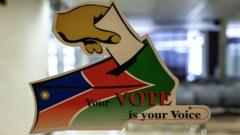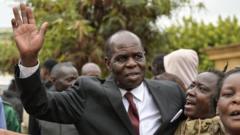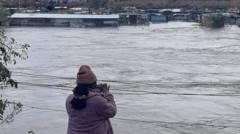This year has marked a significant shift in sub-Saharan Africa's political landscape, with many incumbent parties facing electoral defeats due to widespread public dissatisfaction over issues such as corruption, economic mismanagement, and a desire for democratic governance.
The Shift in Africa's Political Landscape: Voters Challenge Incumbent Parties

The Shift in Africa's Political Landscape: Voters Challenge Incumbent Parties
Analyzing the electoral setbacks faced by governing parties in Africa as citizens demand accountability amid rising economic discontent.
In 2024, Namibia's governing party, Swapo, has managed to cling to power after over three decades, yet its influence has notably waned. Official results revealed that Netumbo Nandi-Ndaitwah, the Swapo candidate, won the presidency with 57% of the vote, making history as the country's first female leader. However, the electoral process was plagued by logistical issues and claims of irregularities, prompting opposition parties to reject the outcome. A puzzling aspect is Swapo's increased presidential vote share, despite suffering significant losses in the parliamentary elections, where it lost 12 of 63 seats, barely maintaining its majority.
On a broader scale, 2024 has been described as an "annus horribilis" for many governments in sub-Saharan Africa facing voter scrutiny. A pattern has emerged where ruling parties suffer heavy seat losses or outright power loss, reflecting a growing public intolerance toward corruption, economic decline, and stifling of political rights. The recent elections in Botswana, where the Botswana Democratic Party (BDP) experienced a drastic reduction to only four parliamentary seats—down from 38—exemplified this trend. Similarly, elections in Mauritius resulted in a monumental defeat for the incumbent Alliance Lepep coalition, which saw its representation diminished dramatically.
The political shifts were also evident in Senegal, where the main opposition candidates won against President Macky Sall's government, even after facing incarceration leading up to the election. The South African ANC, while retaining power, faced challenges for the first time since the end of apartheid, dipping below 50% of the vote and entering coalition negotiations, reflecting eroded public trust.
Numerous factors helped propel these shifts, including heightened economic grievances stemming from rising costs of living and widespread corruption. These sentiments sparked significant protests in countries such as Kenya, showcasing a parallel to global trends where economic dissatisfaction has influenced political outcomes in various regions, including the UK and the US.
In this complex political tapestry, opposition parties have displayed adaptability and strategic collaboration to enhance their electoral prospects. The success of the Umbrella for Democratic Change coalition in Botswana and similar alliances in Mauritius are testament to this adaptability. As upcoming elections in Ghana and Malawi approach, the potential for further opposition victories looms large.
Ultimately, the current state of African governance demonstrates a surprising resilience in democratic practices, challenging the notion that the region is inherently hostile to multiparty politics. With citizens mobilizing for accountability, the landscape suggests that despite facing adversity, African nations might provide valuable insights into sustaining and regenerating democracy in challenging times.
On a broader scale, 2024 has been described as an "annus horribilis" for many governments in sub-Saharan Africa facing voter scrutiny. A pattern has emerged where ruling parties suffer heavy seat losses or outright power loss, reflecting a growing public intolerance toward corruption, economic decline, and stifling of political rights. The recent elections in Botswana, where the Botswana Democratic Party (BDP) experienced a drastic reduction to only four parliamentary seats—down from 38—exemplified this trend. Similarly, elections in Mauritius resulted in a monumental defeat for the incumbent Alliance Lepep coalition, which saw its representation diminished dramatically.
The political shifts were also evident in Senegal, where the main opposition candidates won against President Macky Sall's government, even after facing incarceration leading up to the election. The South African ANC, while retaining power, faced challenges for the first time since the end of apartheid, dipping below 50% of the vote and entering coalition negotiations, reflecting eroded public trust.
Numerous factors helped propel these shifts, including heightened economic grievances stemming from rising costs of living and widespread corruption. These sentiments sparked significant protests in countries such as Kenya, showcasing a parallel to global trends where economic dissatisfaction has influenced political outcomes in various regions, including the UK and the US.
In this complex political tapestry, opposition parties have displayed adaptability and strategic collaboration to enhance their electoral prospects. The success of the Umbrella for Democratic Change coalition in Botswana and similar alliances in Mauritius are testament to this adaptability. As upcoming elections in Ghana and Malawi approach, the potential for further opposition victories looms large.
Ultimately, the current state of African governance demonstrates a surprising resilience in democratic practices, challenging the notion that the region is inherently hostile to multiparty politics. With citizens mobilizing for accountability, the landscape suggests that despite facing adversity, African nations might provide valuable insights into sustaining and regenerating democracy in challenging times.




















